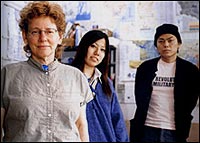Climate Cities
All Stories
-
Who’s on the Right Side of the Road Now?
Brits change habits to save gasoline; Americans don’t Starting in 2008, new drivers in Britain will be tested not only on the anxiety-producing three-point turn, but also on their ability to drive in a manner that conserves gasoline. The country hopes to produce a new generation of eco-aware motorists who accelerate and brake smoothly and […]
-
Have You Hugged Your Tree Today?
On Arbor Day, appreciate the trees Urban forest cover in many U.S. cities has declined about 30 percent over the past 10 to 15 years, according to the green group American Forests, and that’s just not cool. Literally: loss of trees means loss of shade, more AC, and higher energy costs. On Arbor Day (you […]
-
Ford Too Shall TerraPass
Ford teams up with TerraPass to help drivers offset emissions Like the man said, the times they are a-changin’. Slowly, but a-changin’ nonetheless. Ford Motor Co., manufacturer of all things carbon-emitting, is partnering with TerraPass, a carbon-offset company. Tomorrow, Ford is expected to announce a new “Greener Miles” program, whereby customers can visit a website […]
-
How Wendy Brawer put green on the map
Don’t let Wendy Brawer’s urban address fool you — this New Yorker has a soft spot for nature. After all, she’s the founder of Modern World Design, an eco-design firm, and has spent the last 11 years at the helm of the Green Map System, a nonprofit organization dedicated to helping citizens all over the […]
-
SOL: Sustaining Ourselves Locally
 According to the Current TV Studio blog, SOL, a viewer-contributed piece about a sustainable development project in Oakland, will be airing on TV.
According to the Current TV Studio blog, SOL, a viewer-contributed piece about a sustainable development project in Oakland, will be airing on TV.I think this is a good example of how people like you, armed with a camera and a passion, can produce a short film that could potentially reach 28 million homes (according to a company press release [PDF]).
Here's the synopsis on Current:
This is specifically a piece on an urban sustainable development project in Oakland that consists of 9 people working together to do community environment work. Amazing project that focuses on everything from compost and farming to food justice.
-
Oh No He Didn’t
Chrysler official takes public potshot at oil companies What’s more fun than a quiet, simmering feud between Big Auto and Big Oil? A public catfight! Chief Chrysler spokesflack Jason Vines minced no words on a company blog Monday: “Despite a documented history of … hoarding their bounty by avoiding technologies, policies, and legislation that would […]
-
Bay City Tollers
San Francisco looks into congestion charging If you’re going to San Francisco, be sure to wear … a money clip. The city creatively known as “The City” plans to study the possibility of “congestion charges” — making drivers pay to enter downtown during business hours. Critics include some stores in high-traffic areas, which fear that […]
-
Does Richard Louv’s Last Child in the Woods say anything new?
OK, call me a crank, a malcontent, a hypercritical reviewer with a small, crabbed heart. But despite all its earnestness, despite its heartfelt message, which an environmentalist and concerned parent like me should embrace — in brief, that nature is good for children — Richard Louv’s plea to reengage our children with nature left me […]
-
An interview with Richard Louv about the need to get kids out into nature
Richard Louv is an anecdote machine. As we milled about near the door of a Seattle cafe awaiting lunch-hour seating, he kept up a constant stream of witty, telling stories — about “no running” signs on playgrounds, clueless environmental leaders, suffering outdoor-gear execs. I started fumbling for my recorder. Richard Louv. It’s no wonder Louv’s […]
-
Oiling for a Flight
The top 10 best places to live during an oil crisis Pack yer bags, kids — there’s an oil crisis coming and we’re moving to the Big Apple! Eco-website SustainLane has come up with a list of the 10 U.S. cities best able to weather an oil crisis, and New Yawk is number one. The […]
